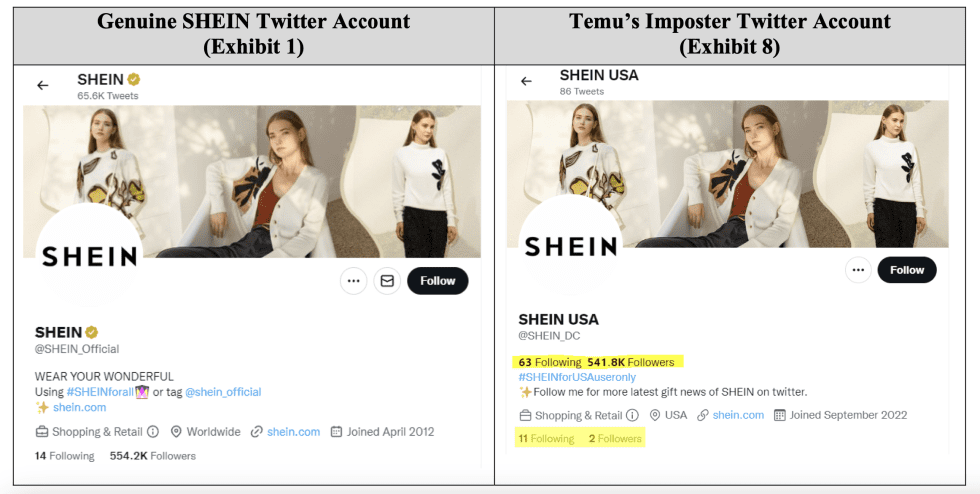Shein and Temu appear to have settled a two-pronged legal clash that pitted the two Chinese e-commerce rivals against one another in federal courts in the U.S. In joint stipulations of voluntary dismissal, Shein and Temu alerted federal courts in Massachusetts and Illinois that they have stipulated to dismiss the two cases – albeit without prejudice, bringing an end to Shein’s trademark counterfeiting, trademark dilution, and copyright infringement lawsuit against Temu, as well as to Temu’s case, in which it accused Shein of engaging in a “scheme of coerced exclusivity, threats, intimidation, and direct financial punishments” in order to avoid “competing fairly and within the bounds of applicable law.”
Shein v. Temu: The in-court battle of the ultra-fast fashion giants got its start back in December 2022 when Shein first filed a lawsuit against Temu, asserting that the popularity of the SHEIN brand among consumers in the U.S. “has skyrocketed in the last several years,” and its trademarks are “now associated with one of the most popular online fashion and lifestyle retailers in the world.” Aware of the well-known SHEIN brand and its success in the U.S. market, Shein alleged that PDD Holdings-owned Temu launched its U.S. online shopping site in September 2022. However, instead of “fairly competing” with Shein “by, for example, offering comparable products at a lower price or by offering a more diverse array of products for selection and purchase by consumers,” Shein argued that Temu “deliberately engag[ed] in unfair competition by exploiting the SHEIN brand.”
With its alleged aim of “divert[ing] consumers and business away” from SHEIN in favor of its own apparel and accessories offerings, Shein asserted that Temu “embarked on a deliberate scheme of impersonating, or aiding and abetting the impersonation of, SHEIN.” In particular, Shein alleged that Temu has established “imposter” Twitter accounts that contained SHEIN trademarks in the handles, included links to authentic SHEIN web domains, and used “the same profile icons and profile photos … as the genuine SHEIN Twitter account” in order to “deceive consumers into downloading its app.” In doing so, Shein claimed that Temu “trade[d] off the recognition and goodwill of the SHEIN marks in order to capture the attention of actual and potential customers of SHEIN-branded goods, and to divert those people into becoming Temu customers.”

Shein, which filed an amended complaint with the U.S. District Court for the Northern District of Illinois in March, alleged that Temu went even further and “used and continues to use [Shein’s] copyrighted images … in connection with the sale and distribution of goods on Temu’s website,” thereby, infringing its copyrights.
Against that background, Shein lodged trademark counterfeiting and infringement, trademark dilution, and copyright infringement, false designation of origin and unfair competition, contributory false advertising, copyright infringement, trademark dilution, deceptive trade practices, product disparagement and trade libel, and unjust enrichment claims.
Temu v. Shein: Fast forward to this summer and Temu filed a lawsuit of its own, claiming that in the wake of its expansion into the U.S., Shein “chose not to compete on the merits by offering better prices, terms, service, or quality,” and instead, has opted to carry out an “scheme of coerced exclusivity, threats, intimidation, and direct financial punishments,” which amounts to conduct that is “the opposite of competing fairly and within the bounds of applicable law.” According to the complaint that it filed with a federal court in Massachusetts in July, Temu highlighted “at least four strategies” that Shein allegedly utilized in order to stifle competition.
Specifically, Temu maintained that Shein: (1) forces manufacturers to enter into adhesion agreements that effectively create exclusive supplier relationships with it and threatens manufacturers with onerous fines and penalties if they supply product to Temu; (2) forces manufacturers to sign loyalty oaths certifying that they will not do business with Temu, but which are silent as to any other competitor or potential competitor; (3) issues public penalty notices and imposes extrajudicial fines on disobedient manufacturers for supplying product to Temu; and (4) sends numerous false notices of copyright infringement to Temu in order to disrupt sales of products that are offered for sale on Temu.
“By October 2022, Shein had begun engaging in all [of the aforementioned] anticompetitive conduct,” and since that time, Temu argued that “more than 10,000 product listings have been pulled from [its site] because of Shein’s scheme.” All the while, Temu alleged that “as of May 2023, Shein was requiring all of the approximately 8,338 manufacturers supplying or selling on the Shein platform” – which represent 70-80 percent of the total number of merchants capable of supplying ultra-fast fashion – “to execute Exclusive-Dealing Agreements, which prevent [them] from offering products on the Temu platform or supplying products to sellers on the Temu platform.”
Such conduct “harms consumers and competition by raising prices for consumers, restricting choice and innovation, and impairing the expansion of the ultra- fast fashion market in the U.S.,” Temu contended, setting out causes of action under Sections 1 and 2 of the Sherman Act, the Clayton Act, as well as the Massachusetts Consumer Protection Law.
The U.S. Government: While the parties have managed to settle these two battles, they are both still facing rising scrutiny from the U.S. government, which is focused most immediately on the workings of their respective supply chains. In addition to enduring calls for Shein’s supply chain to be audited for forced labor ahead of a reported U.S. initial public offering, a Congressional report published in June “offered a blistering critique of popular Chinese retailers Shein and Temu,” the AP revealed, with lawmakers “accusing the latter of failing to maintain ‘even the façade of a meaningful compliance program’ that seeks to prevent goods made by forced labor from being sold on its platform.”
The House Select Committee on the Chinese Communist Party’s report stated that Temu “admitted it ‘does not expressly prohibit’ the sale of goods from Xinjiang and ‘conducts no audits and reports no compliance system to affirmatively examine’ whether its suppliers are observing U.S. forced labor law.” The government’s report also asserted that “the only deterring measure the company reported was making its suppliers agree to ‘boilerplate terms and conditions’ that prohibit forced labor use.”
Both companies have also come under fire for relying on a trade loophole that enables them to benefit from tax exemptions and less oversight from U.S. Customs when they ship packages with contents that are valued at less than $800. “Temu and Shein are building empires around the de minimis loophole in our import rules – dodging import taxes and evading scrutiny on the millions of goods they sell to Americans,” Representative Mike Gallagher, a Wisconsin Republican who chairs the House Select Committee on the Chinese Communist Party, said in a statement this summer.
THE BIGGER PICTURE: The cases and rising government attention comes amid efforts by Shein and Temu to expand into the U.S. market, where they have overtaken competitor brands like H&M, Fashion Nova, Forever 21, and Zara in amassing revenue and market share, alike. While Shein – which nabbed a valuation of $100 billion in April 2022 – was the earlier mover in the U.S. market, becoming the most downloaded shopping app in the U.S. in May 2021 and the most downloaded mobile app in the U.S. in any category a year later, overtaking the likes of Amazon and Instagram, Temu has posed a very real challenge to its domestic dominance.
“Temu’s transformation over the past year is the stuff of business dreams,” Bloomberg reported this month. “Virtually unknown when it launched in the U.S. last September, it is now well and truly trumped industry giant Shein in the country’s ultra-fast e-commerce market.” Temu’s U.S. sales in September, for example, “were more than double Shein’s in the nation,” according to Bloomberg’s data, as both Shein and Temu appear to be targeting a new pool of price-conscious customers (namely, Gen-Zers) that are looking for consistent novelty when it comes to their wardrobes and ultra-low prices.
The cases are Roadget Business PTE. Ltd. v. Whaleco, Inc., 1:22-cv-07119 (N.D. Ill.) and Whaleco Inc. v. Shein US Services LLC et al, 1:23-cv-11596 (D. Mass.)











